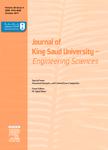版权所有:内蒙古大学图书馆 技术提供:维普资讯• 智图
内蒙古自治区呼和浩特市赛罕区大学西街235号 邮编: 010021

作者机构:Department of Civil and Environmental Engineering Shahjalal University of Science and Technology Sylhet Bangladesh Department of Electrical and Computer Engineering The University of Texas at San Antonio San Antonio United States
出 版 物:《Journal of King Saud University - Engineering Sciences》 (J. King Saud Univ. Eng. Sci.)
年 卷 期:2023年第35卷第2期
页 面:92-100页
核心收录:
学科分类:0821[工学-纺织科学与工程] 0817[工学-化学工程与技术] 08[工学] 0805[工学-材料科学与工程(可授工学、理学学位)] 0703[理学-化学] 0813[工学-建筑学] 0835[工学-软件工程] 0714[理学-统计学(可授理学、经济学学位)] 0814[工学-土木工程] 0701[理学-数学] 0823[工学-交通运输工程] 0812[工学-计算机科学与技术(可授工学、理学学位)]
摘 要:Waste management has become a new challenge for the construction industries since rapid urbanization is taking place worldwide. Ceramic waste is one such material which is being originated from construction sites and industries, imposing a significant risk to the environment due to its non-biodegradable nature. With the goal of waste utilization, this study aims to predict the compressive and splitting tensile strength of concrete made with waste Coarse Ceramic aggregate (CCA) and Nylon Fiber (NF) by using two distinct machine learning algorithms, namely, Support Vector Machine (SVM) and Gradient Boosting Machine (GBM). A comprehensive data set for testing and training the models containing 162 records of compressive and splitting tensile strength test results were considered from nine mix proportions. For training the dataset, parameters like cement content, sand content, stone content, ceramic content, nylon fiber content, curing duration, and concrete strength were taken as input variables. The predicted strengths obtained from the SVM and GBM based models are found to be in close agreement with the experimental results. In terms of coefficient of determination (R2), GBM showed significantly better result for both compressive strength (e.g., SVM Overall R2 = 0.879 & GBM Overall R2 = 0.981) and tensile strength (e.g., SVM Overall R2 = 0.706 & GBM Overall R2 = 0.923) prediction. Furthermore, based on the statistical accuracy measures like the mean absolute error (MAE), mean square error (MSE), root mean square error (RMSE), it has been observed that GBM has yielded much better performance compared to SVM in predicting the mechanical strength of concrete. © 2021 The Authors